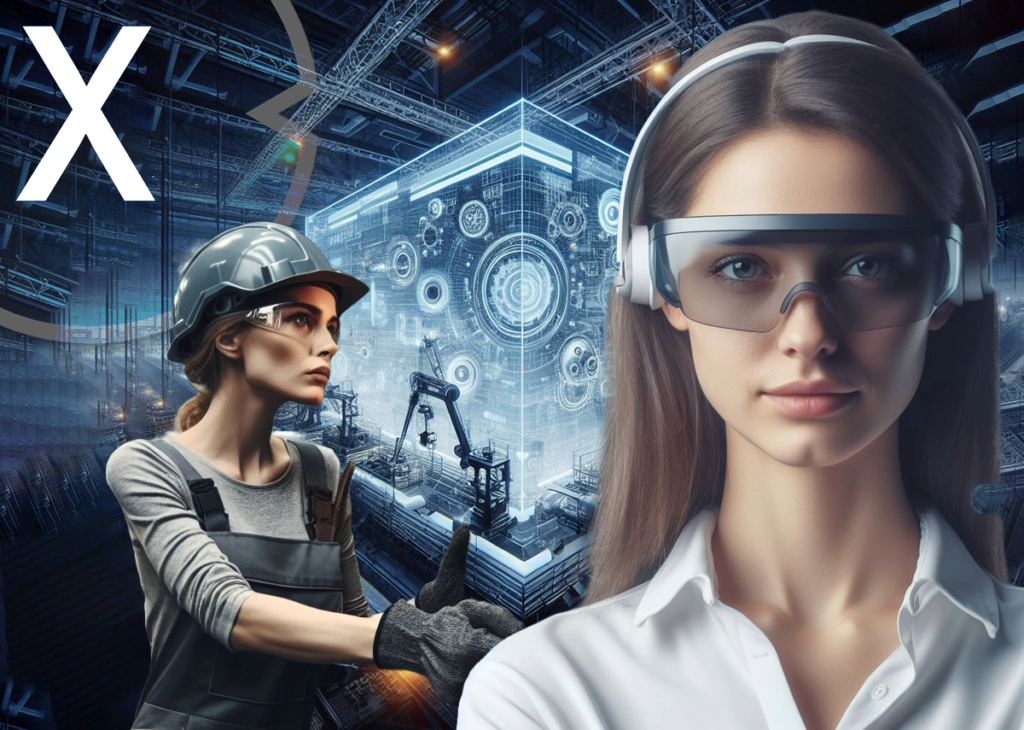Published on: November 10, 2024 / update from: November 10, 2024 - Author: Konrad Wolfenstein
Potential in the Metaverse: Why German companies hesitate
Indecision in the Metaverse: What is blocking German companies?
Although the Metaverse offers potential uses in many industries and areas, German companies remain hesitant to take action themselves. According to a survey by Bitkom, there is general uncertainty regarding the topic. A fifth of companies (20 percent) see the metaverse as an opportunity, while almost as many (17 percent) see it as a risk. Around a quarter (27 percent) have no opinion on this, and 37 percent believe that the Metaverse will have no impact on their own company. At the same time, around 23 percent are interested and open to the Metaverse, while 24 percent are critical and negative. The largest group, 43 percent, is still undecided.
What is worrying is that one in ten companies (10 percent) say that the Metaverse threatens their own business model, and 15 percent even feel that their existence is threatened by the Metaverse. Nevertheless, the vast majority (83 percent) would first like to wait and see what experiences other companies have with the Metaverse. These figures come from a representative survey of 605 companies with at least 20 employees in Germany, which was carried out on behalf of the digital association Bitkom.
Bitkom Managing Director Dr. Bernhard Rohleder emphasizes that the initial euphoria about the Metaverse has subsided, but there is no reason to write off the topic. On the contrary, many applications are already in practical use, especially in the commercial sector. This applies, among other things, to the industrial metaverse with digital twins in production. Rohleder warns: waiting is not a strategy. German companies should examine possible areas of application and closely monitor further technological developments.
More applications and standards desired, less data protection and legal uncertainty
Companies see the biggest challenge surrounding the metaverse as a perceived lack of practical applications (76 percent). Two years ago this proportion was 66 percent, which indicates increasing skepticism. 43 percent of companies see no benefit for themselves, and 14 percent are already investing in other future trends. There are also concerns about the technology: three quarters (73 percent) think it is not yet fully developed, 55 percent complain about insufficient standardization, and 10 percent say there is a lack of external service providers.
There are also regulatory challenges. 67 percent of companies see high data protection requirements as an obstacle, 44 percent complain about legal uncertainties and an unclear legal framework, and 36 percent see IT security requirements as a hurdle. There are also barriers within the company on the way to the metaverse. Around half of the companies lack the necessary know-how (52 percent) or qualified personnel (46 percent). 17 percent each do not have enough financial resources or no time to deal with the topic.
The importance of the Metaverse for the German economy
The Metaverse has the potential to fundamentally change the way companies work. It offers new possibilities for collaboration, product design and customer interaction. For example, companies can use virtual environments to develop and test products before putting them into physical production. In manufacturing, the Industrial Metaverse enables the creation of digital twins that provide real-time data, increasing efficiency and product quality.
Despite these advantages, the reluctance of German companies shows that many questions remain unanswered. The technology is still abstract for many and there is a lack of concrete use cases that make the benefits of the Metaverse tangible. Additionally, the investment costs and resource requirements for implementation are daunting for many companies.
Need for standards and collaboration
Another important aspect is the lack of standardization. Without consistent standards, it is difficult to develop interoperable systems that work seamlessly together. This leads to isolated solutions and inhibits the widespread acceptance of the technology. However, developing standards requires collaboration between companies, industry associations and regulators.
Data protection and legal framework conditions
Concerns about data protection and legal uncertainties are also significant obstacles. The strict data protection laws in Germany and the EU, such as the GDPR, place high demands on the processing and storage of data. Companies must ensure they meet these requirements, which requires additional resources. In addition, many legal questions in the context of the Metaverse are still unresolved, such as intellectual property, liability and consumer rights.
Ways to overcome the obstacles
To overcome the obstacles, companies must act proactively. They should build internal capabilities by training employees and hiring specialized professionals. Partnerships with technology providers and research institutions can help to acquire the necessary know-how. In addition, it is important to start pilot projects in order to gain practical experience and evaluate the benefits of the Metaverse for your own business model.
The role of politics and associations
Politicians and industry associations are also called upon to improve the framework conditions for the use of the Metaverse. This includes creating a clear legal framework, promoting standardization initiatives and providing funding for research and development.
Possibilities and application scenarios
Despite the current reluctance, there are signs that investment in the metaverse will increase in the coming years. Technological advances, such as the improvement of virtual and augmented reality technologies, the further development of blockchain and increasing connectivity through 5G, are creating new possibilities and application scenarios.
Companies that invest in the metaverse early and gain experience could gain long-term competitive advantages. You can develop innovative business models, open up new markets and implement more efficient processes.
The Metaverse represents both a challenge and an opportunity for the German economy. While the current reluctance is based on understandable concerns, companies should not ignore the development. A strategic approach that weighs the opportunities and risks can help successfully harness the potential of the Metaverse.
By acting proactively, promoting innovation and collaborating with various stakeholders, existing barriers can be overcome. Ultimately, the Metaverse could make an important contribution to the digital transformation of the German economy and strengthen its competitiveness on a global level.
Suitable for:
- Industrial Metaverse 2024: Smart Manufacturing & XR technologies – Image: Xpert.Digital
- Internet of Experience (IoE): thinking beyond the Industrial Metaverse – Image: Xpert.Digital
- The integration of AI into the business strategy of companies in the Industrial Metaverse - Image: Xpert.Digital - AI & XR 3D Rendering Machine (art photo/AI)
- Big Data and Artificial Intelligence (AI) in the Industrial Metaverse – Image: Xpert.Digital – AI & XR-3D Rendering Machine (Kunstfoto/AI)
- Industrial Metaverse with NVIDIA Omniverse – Virtual commissioning of new halls and systems – Image: Mercedes-Benz AG
- Mercedes-Benz: Industrial Metaverse and Digital Twin in Production – Image: Mercedes-Benz AG
Key findings of the survey
Waiting attitude: German economy in the metaverse dilemma
The German economy continues to be hesitant and cautious regarding the Metaverse. Although many companies recognize the potential of the Metaverse in various industries and areas, they are often uncertain and hesitant about their own participation. A representative survey by the digital association Bitkom among 605 companies with at least 20 employees illustrates this reluctance.
Opportunities and risks
A fifth of companies (20%) see the metaverse as an opportunity, while almost as many (17%) see it as a risk. A quarter (27%) cannot give an opinion and 37% believe the metaverse will have no impact on their business.
interest and rejection
Around 23% of companies are interested and open to the Metaverse, while 24% are critical and negative about the topic. The largest group (43%) is still undecided.
Threat potential
One in ten companies (10%) sees the metaverse as a threat to their own business model, and 15% feel their existence is at risk.
Wait
Despite these uncertainties, 83% of companies want to wait and see what experiences other companies have with the Metaverse.
Challenges for implementation
Lack of applications and standards
The biggest challenge for companies is a perceived lack of practical applications (76%). In addition, 55% complain about inadequate standardization.
Technological maturity
Three quarters of companies (73%) do not consider the Metaverse technology to be fully developed yet.
Regulatory hurdles
Data protection requirements (67%), legal uncertainties (44%) and unclear IT security requirements (36%) represent further major hurdles.
Internal obstacles
Internally, many companies lack know-how (52%) and qualified personnel (46%). In addition, 17% do not have enough financial resources or time to deal with the topic.
Check possible areas of application
Although the initial euphoria about the Metaverse has subsided, Bitkom CEO Dr. Bernhard Rohleder continues to have great potential, especially in the commercial sector, for example through the *Industrial Metaverse* with digital twins in production. German companies should therefore examine possible areas of application and closely follow technological developments instead of just waiting.
Suitable for:








